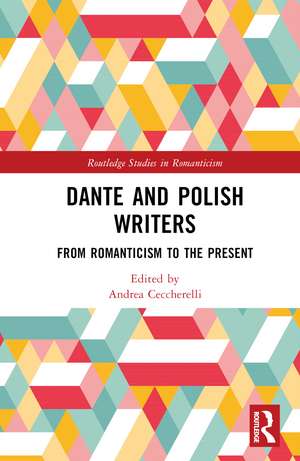Dante and Polish Writers: From Romanticism to the Present: Routledge Studies in Romanticism
Editat de Andrea Ceccherellien Limba Engleză Hardback – 22 feb 2024
Din seria Routledge Studies in Romanticism
-
 Preț: 324.16 lei
Preț: 324.16 lei -
 Preț: 442.68 lei
Preț: 442.68 lei -
 Preț: 332.75 lei
Preț: 332.75 lei -
 Preț: 383.30 lei
Preț: 383.30 lei -
 Preț: 381.00 lei
Preț: 381.00 lei -
 Preț: 416.22 lei
Preț: 416.22 lei -
 Preț: 445.56 lei
Preț: 445.56 lei - 20%
 Preț: 260.13 lei
Preț: 260.13 lei - 16%
 Preț: 261.17 lei
Preț: 261.17 lei - 26%
 Preț: 764.62 lei
Preț: 764.62 lei -
 Preț: 442.88 lei
Preț: 442.88 lei -
 Preț: 463.62 lei
Preț: 463.62 lei - 20%
 Preț: 259.51 lei
Preț: 259.51 lei -
 Preț: 447.51 lei
Preț: 447.51 lei -
 Preț: 389.66 lei
Preț: 389.66 lei - 18%
 Preț: 1000.27 lei
Preț: 1000.27 lei -
 Preț: 389.66 lei
Preț: 389.66 lei -
 Preț: 389.70 lei
Preț: 389.70 lei - 18%
 Preț: 1218.89 lei
Preț: 1218.89 lei -
 Preț: 469.34 lei
Preț: 469.34 lei -
 Preț: 390.84 lei
Preț: 390.84 lei - 18%
 Preț: 1015.82 lei
Preț: 1015.82 lei -
 Preț: 392.60 lei
Preț: 392.60 lei - 18%
 Preț: 1109.99 lei
Preț: 1109.99 lei - 13%
 Preț: 323.82 lei
Preț: 323.82 lei - 26%
 Preț: 764.20 lei
Preț: 764.20 lei -
 Preț: 383.68 lei
Preț: 383.68 lei -
 Preț: 416.22 lei
Preț: 416.22 lei -
 Preț: 484.69 lei
Preț: 484.69 lei -
 Preț: 433.05 lei
Preț: 433.05 lei -
 Preț: 448.49 lei
Preț: 448.49 lei
Preț: 998.08 lei
Preț vechi: 1217.17 lei
-18% Nou
Puncte Express: 1497
Preț estimativ în valută:
190.99€ • 204.23$ • 159.24£
190.99€ • 204.23$ • 159.24£
Carte tipărită la comandă
Livrare economică 17 aprilie-01 mai
Preluare comenzi: 021 569.72.76
Specificații
ISBN-13: 9781032365626
ISBN-10: 1032365625
Pagini: 194
Dimensiuni: 152 x 229 x 13 mm
Greutate: 0.39 kg
Ediția:1
Editura: Taylor & Francis
Colecția Routledge
Seria Routledge Studies in Romanticism
Locul publicării:Oxford, United Kingdom
ISBN-10: 1032365625
Pagini: 194
Dimensiuni: 152 x 229 x 13 mm
Greutate: 0.39 kg
Ediția:1
Editura: Taylor & Francis
Colecția Routledge
Seria Routledge Studies in Romanticism
Locul publicării:Oxford, United Kingdom
Public țintă
PostgraduateNotă biografică
Andrea Ceccherelli is Full Professor of Slavistics – Polish Language and Literature at the University of Bologna and Chair of the Center for Contemporary Poetry at the same university. His main fields of research are Polish literature of the sixteenth–seventeenth and twentieth centuries, Polish-Italian comparative studies (e.g. the presence of Dante in Miłosz’s works), translation and self-translation (e.g. Gombrowicz). He has authored a monograph on Piotr Skarga’s collection of the lives of Saints (2003) and contributed chapters on Renaissance and Modernism to the Einaudi History of Polish Literature (2004, translated into Polish in 2009), and co-authored a book on Wisława Szymborska, Szymborska. Un alfabeto del mondo (An Alphabet of the World) (2016). He is also a translator of Polish contemporary literature into Italian (Czesław Miłosz, Zbigniew Herbert, Józef Czapski, Anna Świrszczyńska, Kornel Filipowicz, Jan Twardowski, Wisława Szymborska, and Adam Zagajewski). In addition, he has translated Szymborska’s biography by Anna Bikont and Joanna Szczęsna (2015), as well as the memories of Szymborska’s secretary Michał Rusinek (2019).
Cuprins
Notes on Contributors
Acknowledgments
Inhuman, transhuman, posthuman: An introduction to Polish Danteism over the centuries
Andrea Ceccherelli
1. Dante and Mickiewicz. The story of a common journey
Tomasz Jędrzejewski
2. Słowacki’s Poem of Piast Dantyszek, or the macabre despair of a father-land
Krystyna Jaworska
3. Reason and will: Dante and Krasiński, a comparison
Marina Ciccarini
4. Dante in Norwid’s Prayer Book
Francesco Cabras
5. Echoes of Inferno V in Kraszewski’s narrative and lyrical work
Andrea F. De Carlo
6. “Better to fall with Alighieri than to triumph with Nogaret”: Klaczko’s personal Dante
Luca Bernardini
7. The Dante of Stanisław Vincenz
Lorenzo Costantino
8. Teodor Parnicki encounters Dante. Only Beatrice and not only
Marcin Wyrembelski
9. From parody to polemical pamphlet: Gombrowiczian deformations of Dante
Andrea Ceccherelli
10. On Czesław Miłosz’s debt to Dante
Luigi Marinelli
11. What Dante owes to Stanisław Barańczak
Marcello Piacentini
12. Dante in twenty-first-century Poland: The case of Jarosław Mikołajewski
Leonardo Masi
Index
Acknowledgments
Inhuman, transhuman, posthuman: An introduction to Polish Danteism over the centuries
Andrea Ceccherelli
1. Dante and Mickiewicz. The story of a common journey
Tomasz Jędrzejewski
2. Słowacki’s Poem of Piast Dantyszek, or the macabre despair of a father-land
Krystyna Jaworska
3. Reason and will: Dante and Krasiński, a comparison
Marina Ciccarini
4. Dante in Norwid’s Prayer Book
Francesco Cabras
5. Echoes of Inferno V in Kraszewski’s narrative and lyrical work
Andrea F. De Carlo
6. “Better to fall with Alighieri than to triumph with Nogaret”: Klaczko’s personal Dante
Luca Bernardini
7. The Dante of Stanisław Vincenz
Lorenzo Costantino
8. Teodor Parnicki encounters Dante. Only Beatrice and not only
Marcin Wyrembelski
9. From parody to polemical pamphlet: Gombrowiczian deformations of Dante
Andrea Ceccherelli
10. On Czesław Miłosz’s debt to Dante
Luigi Marinelli
11. What Dante owes to Stanisław Barańczak
Marcello Piacentini
12. Dante in twenty-first-century Poland: The case of Jarosław Mikołajewski
Leonardo Masi
Index
Descriere
It explores the phenomenon of Polish Danteism from a hermeneutic perspective.The essays examine a series of “encounters” with Dante that have borne creative reworkings and original interpretations by eminent authors such as Mickiewicz, Gombrowicz, Miłosz, up to contemporary poets.
